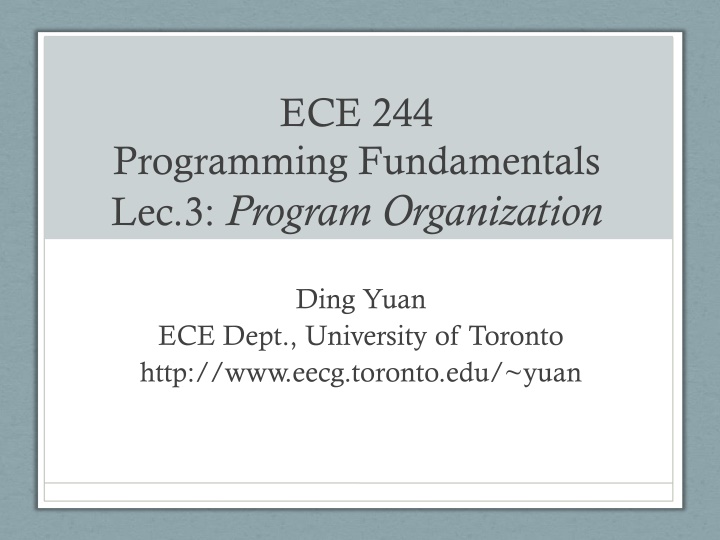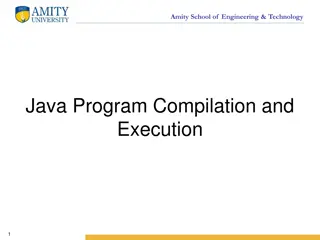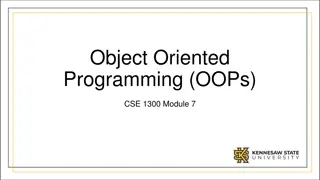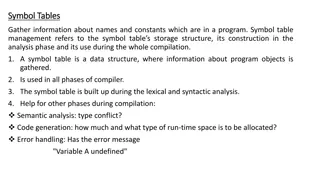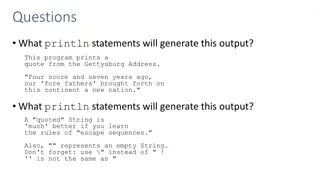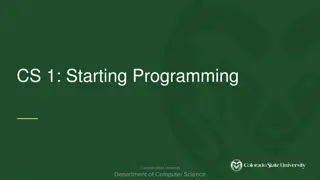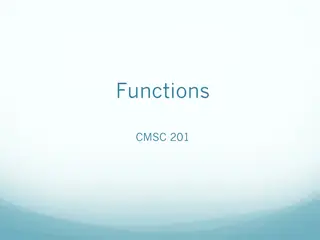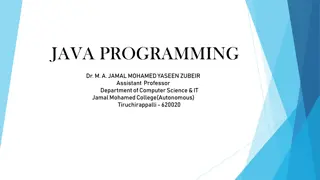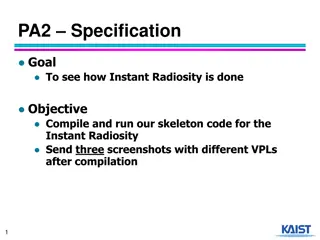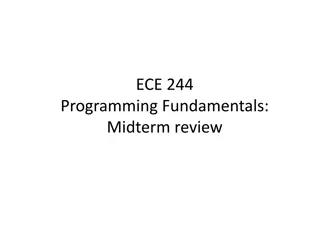Programming Fundamentals: Organizing C++ Code and Compilation Steps
Lecture notes covering program organization in C++, including using header and .cc files, the importance of multiple files for code organization, example linked list implementation, file structure for a linked list program, compilation process with g++, and the purpose of #include directives.
Download Presentation

Please find below an Image/Link to download the presentation.
The content on the website is provided AS IS for your information and personal use only. It may not be sold, licensed, or shared on other websites without obtaining consent from the author.If you encounter any issues during the download, it is possible that the publisher has removed the file from their server.
You are allowed to download the files provided on this website for personal or commercial use, subject to the condition that they are used lawfully. All files are the property of their respective owners.
The content on the website is provided AS IS for your information and personal use only. It may not be sold, licensed, or shared on other websites without obtaining consent from the author.
E N D
Presentation Transcript
ECE 244 Programming Fundamentals Lec.3: Program Organization Ding Yuan ECE Dept., University of Toronto http://www.eecg.toronto.edu/~yuan
Content of this lecture Organizing C++ code into .h and .cc files Use of #ifndef in .h files
Why multiple files? First of all, technically you don t HAVE to use multiple files But it is a good practice Just like you don t put all statements in one line Why multiple files? Speed up compilation Only compiles a .cc file when it is changed Keep your code organized Separate interface from implementation E.g. function prototype from definition
Example: linked list 5 187 23 3 /* Always insert from the beginning, return the new head. */ Node* insert (Node* head, int value); /* Search the list; if found, return the node. * Return NULL if not found. */ Node* search (Node* head, int value);
The Files linked_list.h Header file: declarations of functions & data structures insert.cc Implementation of list_insert function search.cc Implementation of list_search function main.cc Implementation of main function
Compilation > g++ -c insert.cc o insert.o -c: compile source files without linking Generates object file (insert.o) > g++ -c search.cc o search.o > g++ -c main.cc o main.o > g++ insert.o search.o main.o o linked_list -This steps is linking: it links the 3 object files, and outputs an executable file linked_list
#include What does #include file do? Copy the content of file into the current file It belongs to a class of instructions called pre-processor directives (more on this next lecture) Can I include .cc file, instead of .h? Yes, but it s really bad practice; why? What should go into .h file? Prototypes instead of implementations! E.g., Function declaration instead of definition, class interface instead of implementation (later in this course) What is the difference between <> and ? E.g., #include <iostream> vs. #include linked_list.h Can I include the same .h file multiple times?
#ifndef: include guard Prevent the same .h file from being included multiple times! // b.h #include mystruct.h void bar(); // main.cpp #include a.h #include b.h int main() {..} // mystruct.h struct A { }; // a.h #include mystruct.h void foo(); Remember: always always always guard your header file!!
